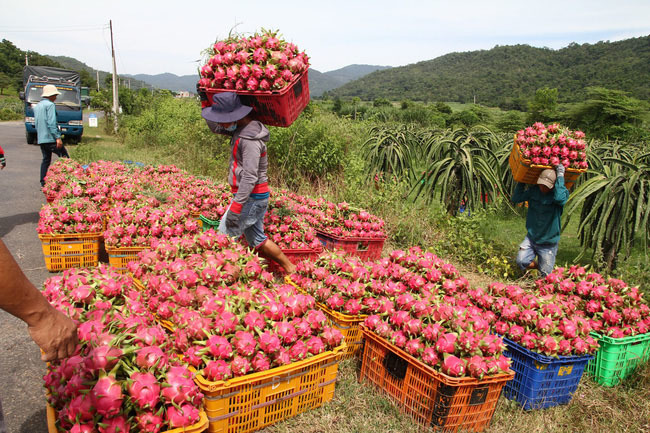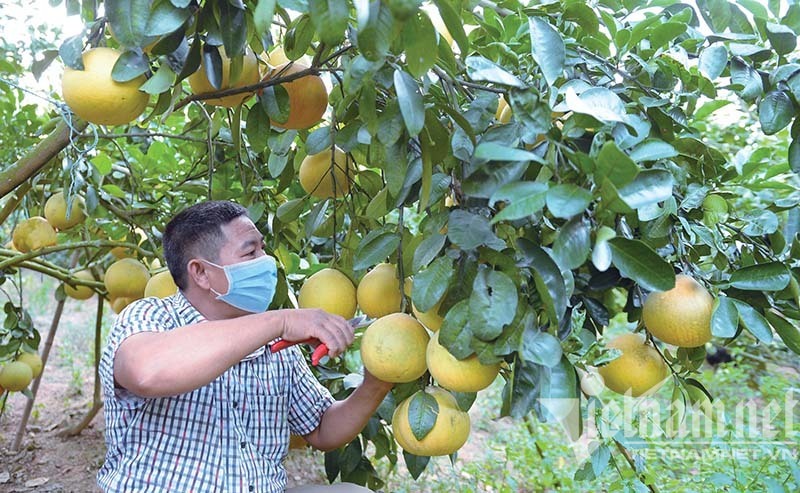 News
News
Vietnamese agricultural products exported to the EU market are constantly warned about food quality and safety, even being recalled. Experts say that it is necessary to change the mindset, and doing the "snatching" style will not be sustainable.
Alarm on agricultural products exported to the EU
As a potential market, after more than a year of the EVFTA Agreement taking effect, Vietnamese agricultural products exported to the EU market increased sharply. In the difficult context of the Covid-19 epidemic, in the first eight months of 2021, Vietnam's agricultural, forestry and fishery exports to this market reached $2.38 billion, up 8.1% over the same period in 2020.
The EU has become the third largest market for Vietnamese agricultural products. However, recently, Vietnamese agricultural products exported to this market have been constantly warned about food safety.
Specifically, at the beginning of September 2021, the SPS Vietnam Office received a warning from the European Union for frozen frog thighs because it contained the banned substance nitrofurans (furazolidone) with a residue level of 17 µg/kg-ppb. The manufacturer is Ngoc Ha Trading and Food Processing Co., Ltd, located in Chau Thanh district, Tien Giang province. France has recalled the product from the market, while Switzerland has used destruction.
 |
| Vietnam's dragon fruit has been tested by the EU for pesticides (photo: TL) |
At this time, the EU continues to warn the manufacturer's pomelo product is "Nguyen Truc Thuy", located in Hamlet 1, Ho Phong town, Gia Rai town (Bac Lieu). Caused by containing banned substances propargite 0.23 ppm and fenobucarb 0.032 ppm exceeding the permissible limit. The product was immediately recalled by Norway on the market.
In early October 2021, the Ministry of Industry and Trade announced the recall of a batch of fragrant rice like ST25 Queen brand in Belgium. Vietnamese exporters actively recalled because the test results found that there was a residue of tricyclazole in excess of the permitted level.
Also in October, a number of agricultural products such as rambutan, dried wood ear, black pepper, cinnamon powder, or Vietnamese seafood products exported to the EU market were also warned of residues of harmful substances. Even rambutan products were found to have banned substances.
After continuously warning about food safety for many shipments of agricultural and aquatic products from Vietnam, on November 3, the European Commission published an amendment to Regulation (EU) 2019/1793 on temporary application. official and emergency control measures for certain foods imported into the EU.
Accordingly, the frequency of pesticide testing with specific herbs and fruits of Vietnam: coriander 72%, basil 20%, okra 20-30%, pepper 20%, dragon fruit ten%...
Testing begins November 15, 2021. Periodically, every six months, the Commission will review the lists of food and feedstuffs of non-animal origin from certain third countries subject to the temporary strengthening of official control measures. at border checkpoints to ensure food safety.
If you run after the number, you will only "lose"
Commenting that the EU market still has a lot of potential, but it is difficult, with strict regulations on consumer protection, Minister of Agriculture and Rural Development Le Minh Hoan said that it is time for ministries, branches and localities Local authorities and businesses need to coordinate to develop an overall strategy and action plan to promote fruit and vegetable exports to this market.
According to Minister Hoan, the three biggest obstacles for Vietnamese agricultural products when reaching out to the world are climate change, market fluctuations and changes in consumption trends. In particular, the world is strongly shifting to green production and consumption.
 |
| SPS Vietnam Office recommends controlling and properly using plant protection chemicals and food safety hazards with fruit trees and spices. |
At a recent seminar, from the perspective of enterprises exporting agricultural products, Mr. Nguyen Khac Tien - Chairman of the Board of Directors of Ameii Vietnam Joint Stock Company - said that businesses need to be more serious in controlling their production processes. me. Control from planting, tending, harvesting, to product testing.
Not only with their export products, according to Mr. Tien, enterprises need to be careful when processing for other units. Because, many businesses now focus only on controlling their products, forgetting that as long as one business is weak, the whole system will be affected.
In order for Vietnamese agricultural products to be exported to markets, including the EU, Mr. Ngo Xuan Nam, Deputy Director of SPS Vietnam Office, said that if you want to export goods to any market, you must meet all requirements. standards of that market.
“People make regulations, research based on science, of course we have to change to meet the requirements. We should not be too hasty, if we run after exports, the quantity will only be lost," he said.
In fact, when participating in deep integration, countries still have violations and are warned, this is normal. It is important that we try our best not to violate. The problem is that after each warning, what lessons do we learn and why?
Mr. Nam said that, for commercial and processing enterprises, it is necessary to change to focus on product quality. In addition, there is a need for a technical research department, especially for small businesses. SPS has prepared lectures for businesses, cooperatives, and producers, through which they can grasp the technical standards of the markets to produce suitable goods.
Inner peace